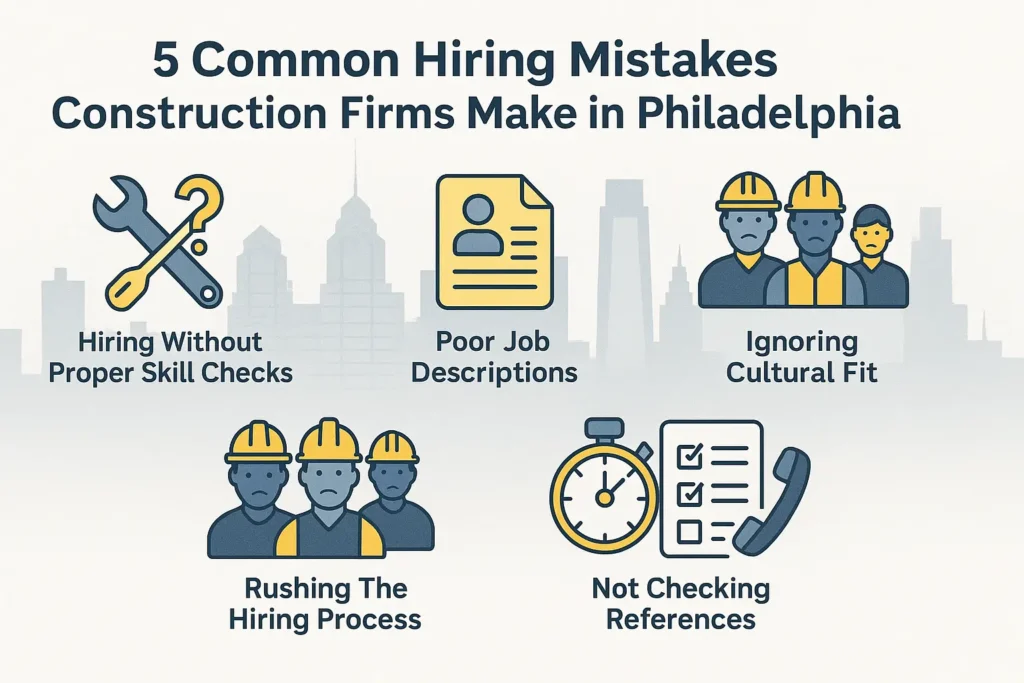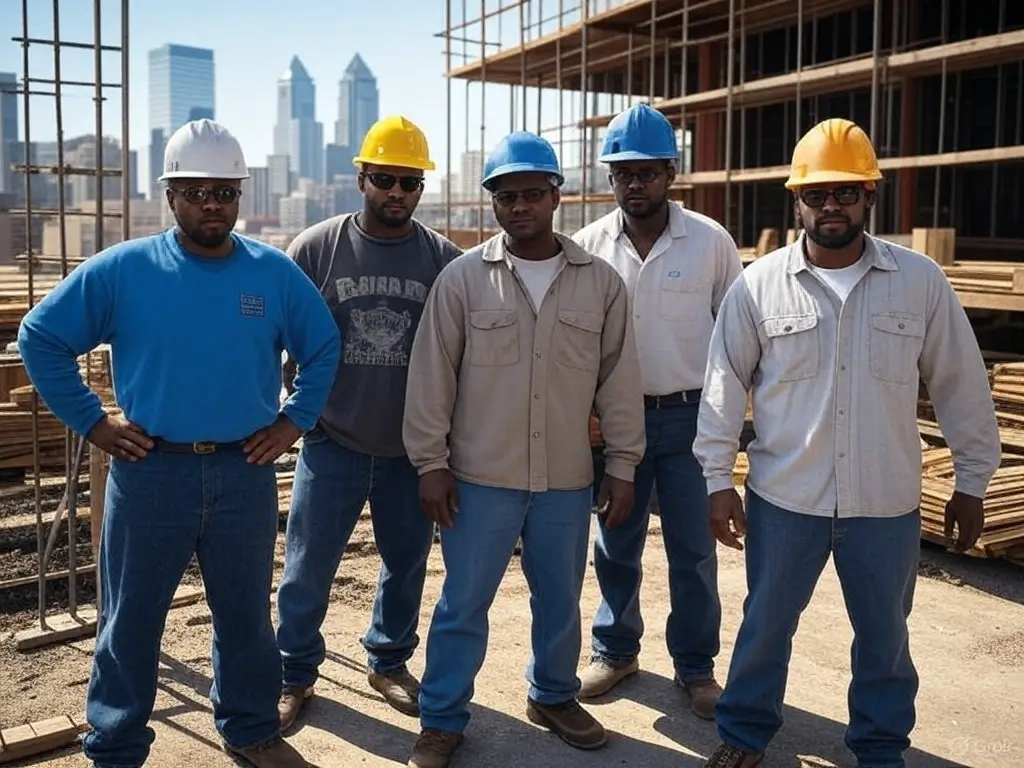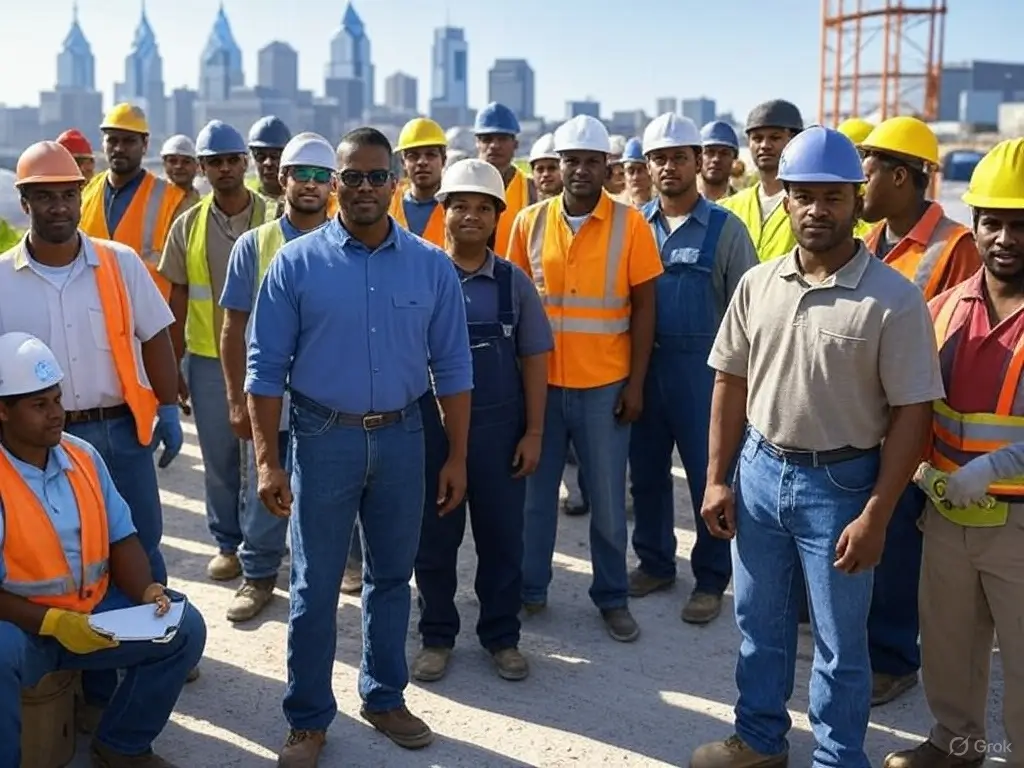
Construction firms in Philadelphia pay dearly when they make hiring mistakes – the cost goes way beyond time and money. 62% of contractors across the country struggle to hire skilled workers, and 45% have had to turn down projects because they couldn’t find enough skilled labor. These challenges hit Philadelphia construction firms even harder than most.
Philadelphia’s unique construction landscape creates extra pressure on the labor market. The city’s historic preservation codes and dense urban environment just need workers with specialized skills. Finding the right people takes time, yet many companies rush to hire based on the lowest quote alone. This approach often results in project delays, higher costs, safety issues, and possible legal problems. Our work with the Philadelphia Technician Training Institute (PTTI) has taught us that construction staffing means more than filling empty positions. Companies must find professionals who truly understand what it takes to work in every neighborhood from Fishtown to South Philadelphia. This piece will show you the five most common hiring mistakes Philadelphia construction firms make and the best ways to avoid them.
Hiring Without Understanding Philadelphia’s Unique Construction Needs
Philadelphia stands apart from other construction markets. Construction firms often make a crucial mistake by using generic hiring approaches in a city that needs specific building expertise. Companies that hire without understanding our city’s unique construction requirements face expensive delays and extra work.
Success in Philadelphia’s construction industry needs workers who grasp our city’s unique challenges. A project in Old City needs knowledge of historic preservation ordinances – rules that rarely exist elsewhere. Projects in Fishtown or Northern Liberties often squeeze between row homes and need special skills to solve complex problems.
Local knowledge matters more than you might think. Philadelphia’s infrastructure has some of America’s oldest utility systems. Workers need extra caution and special training that generic hires rarely possess. Teams unfamiliar with Philly’s building codes make mistakes that cause failed inspections and project slowdowns.
Experience shows how local expertise helps navigate Philadelphia’s complex permitting process. Teams who know the ins and outs of our city’s L&I department save weeks of project time with proper prep work and documentation.
Our partnership with the Philadelphia Technician Training Institute (PTTI) connects firms with local professionals who understand these challenges well. These workers bring knowledge about our city’s soil conditions and neighborhood-specific building requirements.
Avoid this hiring mistake today — let’s talk about a free staffing consultation for your Philadelphia projects. We’ll help you find candidates with local expertise that leads to success in our unique urban setting.
Ready to prevent these mistakes? Get our free checklist made for Philly construction firms to improve their hiring process. This guide ensures you value Philadelphia-specific construction knowledge in your next hire.
Using Generic Job Descriptions That Miss the Mark
Generic job descriptions are hurting your chances of finding top construction talent in Philadelphia. Construction differs from other industries because it needs specificity, especially in a city with unique building requirements and specialized skills.
The problem starts with copy-paste job postings. Philadelphia construction firms often use outdated templated job listings or borrow generic descriptions from online sources. These vague listings don’t attract qualified candidates because they fail to address Philadelphia’s construction world’s specific challenges.
Recruitment experts say effective job postings should start with a clear, descriptive title and provide a detailed overview of responsibilities, qualifications, and benefits. Many construction firms skip significant Philadelphia-specific details that would draw the right local talent.
A well-crafted job description is your first touchpoint with potential candidates and shows your company’s professionalism. Generic descriptions tell skilled workers that you don’t understand Philadelphia’s market.
Construction firms that customize their job descriptions to showcase Philadelphia-specific skills attract more qualified applicants. This targeted strategy saves time by reducing irrelevant resume reviews. Mentioning experience with Old City’s historic preservation codes or knowledge of Philadelphia L&I processes shows candidates your understanding of the local market.
Your construction job descriptions should:
- Specify Philadelphia-specific qualifications (like knowledge of local building codes)
- Detail neighborhood-specific skills needed (working in dense urban areas)
- Include your company’s role in Philadelphia’s construction community
Generic descriptions lead to hiring staff who can’t handle Philadelphia’s unique challenges. Our PTTI partnership helps create targeted job descriptions that attract candidates with the exact skills your Philadelphia projects need.
Ready to change your hiring process? Download our free Philadelphia-specific job description templates made for construction firms in our city.
Skipping Background Checks and Credential Verifications
Background check shortcuts put your Philadelphia construction firm at serious legal and safety risks. Since October 2020, Pennsylvania law requires all construction employers to verify employment eligibility through E-Verify. Many firms still skip this crucial step.
The legal stakes are high. Act 75 prohibits construction companies from knowingly hiring unauthorized workers. The first violation results in warning letters but repeat offenses within 10 years trigger legal action from the Attorney General. Your business license could face suspension for at least a year after multiple violations. Proper verification isn’t just an option—your business operation depends on it.
Philadelphia’s construction boom has in part relied on undocumented workers. About 14% of all construction workers nationally are immigrants without work authorization. This creates a concerning situation where workers without documentation often face dangerous conditions with limited options.
Background checks protect more than paperwork:
- They keep people with violent histories away from your job sites
- They ensure workers handling dangerous equipment don’t have substance abuse issues
- They validate educational credentials and prevent liability for incompetence
OSHA violations can get pricey. Philadelphia companies like Max Contractors Inc. received citations for 5 willful and 21 serious violations in 2021 alone. Safety remains paramount—in 2020, 351 construction workers died from falls nationwide.
Our PTTI partnership gives you access to properly vetted, locally-trained professionals who understand Philadelphia’s unique construction challenges. PTTI students show a 71.07% successful job placement rate, helping you find qualified workers who meet all legal requirements.

Rushing the Hiring Process During Philly’s Construction Boom
The construction boom in Philadelphia tempts many companies to cut corners while hiring. Projects like the $1.5 billion Penn’s Landing redevelopment push firms to value speed over quality as they build their teams. This rush creates mistakes that affect project timelines, quality, and safety.
Boom cycles create pressure to fill positions faster. Philadelphia’s construction firms struggle with quick staffing needs during peak seasons. Companies often hire the first available workers instead of getting a full picture of candidates to meet deadlines. Quick fixes might help right now but create problems later when new hires lack the skills needed for Philadelphia’s unique construction environment.
Companies compromise their standards during busy periods despite knowing better. My experience shows this creates:
- More safety incidents on job sites
- Higher turnover rates among new hires
- Project delays due to skill mismatches
- More rework and quality issues
- Damage to company’s reputation
The numbers tell a clear story. A proper hiring process might need an extra week, but rushed hires cause longer delays. The quick “win” of filling positions now brings much more pain later.
Our partnership with the Philadelphia Technician Training Institute (PTTI) helps solve this challenge. Their pre-vetted candidates know Philadelphia’s construction world and come job-ready. This lets you keep quality standards high even during busy times.
Avoid this mistake today — ask for a free staffing consultation designed for your Philadelphia projects. We can help create a hiring strategy that balances speed with quality. You’ll meet deadlines without cutting corners.
Ignoring Soft Skills Critical for Philly Job Sites
Philadelphia construction managers often focus only on technical skills and overlook the human side of things when hiring new team members. This creates real problems on job sites throughout the city, from historic preservation work in Old City to new builds popping up in South Philadelphia.
Technical know-how isn’t enough for Philly construction success. Research shows that hiring managers consistently rank ethical judgment, adaptability, and critical thinking as their candidates’ most valuable skills. All the same, construction firms rarely look for these qualities in potential hires.
This hiring mistake comes with real costs. Philadelphia’s ever-changing construction world needs workers who can:
- Talk clearly with everyone involved, from historic committees to neighborhood groups
- Roll with the punches when things change, especially in Philly’s older areas
- Think on their feet when surprises pop up
- Team up smoothly in the city’s tight spaces
- Take charge and own their work on complex projects
People who are good at these things get better results. We see it in the field – workers with strong people skills help things run smoother and cut down on mix-ups. They also build better relationships with clients that turn into long-term partnerships and repeat business.
We work with the Philadelphia Technician Training Institute (PTTI) to fill this gap. PTTI’s program has workplace communication, teamwork, leadership, and money management training. Students learn both the technical side and people skills they need to succeed on Philadelphia job sites.
Conclusion
The five critical hiring mistakes show why Philadelphia construction firms don’t deal very well with staffing challenges. These errors go beyond monetary costs. They affect project timelines, quality standards, workplace safety, and end up damaging your company’s reputation in Philadelphia’s competitive market.
Our experience shows construction companies achieve better project outcomes when they create targeted job descriptions, verify credentials properly, and avoid rushing their hiring during busy periods. On top of that, our partnership with the Philadelphia Technician Training Institute (PTTI) links firms to pre-vetted professionals who know the ins and outs of working in areas from Fishtown to Germantown.
Looking to elevate your construction projects with top-tier Philadelphia professionals? Philly Trade Experts pairs you with dependable, PTTI-certified drywall contractors who are well-versed in local building codes and fully certified. Contact us at 215-381-9403 or stop by our office at 1901 West Girard Avenue. We’ll connect you with skilled experts tailored to your project’s unique requirements.
FAQs
Philadelphia’s construction landscape presents distinct challenges, including historic preservation codes, dense urban environments, and complex permitting processes. Hiring managers need to find workers familiar with these local nuances to ensure project success.
Philadelphia’s construction landscape presents distinct challenges, including historic preservation codes, dense urban environments, and complex permitting processes. Hiring managers need to find workers familiar with these local nuances to ensure project success.
Rushing to hire during busy periods often leads to poor candidate selection, resulting in increased safety incidents, higher turnover rates, project delays, and quality issues. Taking the time to thoroughly vet candidates is crucial for long-term success.
Soft skills are crucial for success in Philadelphia’s construction sector. Effective communication, adaptability, problem-solving, and teamwork are essential, especially when working in diverse neighborhoods and on complex urban projects.
Neglecting proper background checks and verifications can expose construction firms to legal liabilities, safety risks, and potential fines. It’s essential to comply with Pennsylvania’s E-Verify requirements and ensure all workers are properly qualified and authorized.
To attract the right talent, job descriptions should highlight Philadelphia-specific qualifications, such as knowledge of local building codes and experience with urban construction challenges. Including details about the company’s role in the local construction community can also help attract suitable candidates.


